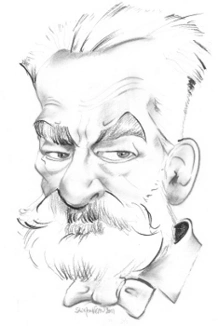HAASE, HUGO
Publié le 22/02/2012

Extrait du document

HAASE, HUGO (1863–1919), politician; first chairman of the USPD. Born
to a Jewish merchant in East Prussia's Allenstein, he studied law before opening
a legal practice in Ko¨nigsberg. He thereafter gained renown defending the poor.
Elected the first Social Democrat on Ko¨nigsberg's city council in 1894, he attracted
national attention in 1904 with his defense of Otto Braun* (Prussia's*
future Prime Minister). A voice of the SPD's orthodox wing, he served in the
Reichstag* during 1897–1907 and, backed by August Bebel and Karl Kautsky,
succeeded Paul Singer in 1911 as Party cochairman (with Bebel until 1913, then
with Friedrich Ebert*). He was returned to the Reichstag in 1912 and remained
in the chamber throughout the war.
Although his Kantian humanism led Haase to oppose Party policy at the
outbreak of World War I, he voted for war credits and kept his views private
until the spring of 1915. But because of the war's length, his pacifism led him
to resign from the SPD in March 1916. He served as cochairman of the new
USPD from its founding until he died in November 1919, some weeks after
being shot by an assassin. Highly ethical, he continued his law practice throughout
his career and never accepted a salary from either party that he served.
Haase was USPD spokesman during the Party's affiliation with the Council
of People's Representatives.* A Party moderate, he supported parliamentary
social democracy and argued in his last months for a pragmatism that rejected
the adventurism of a putsch. His murder was a severe blow that set the USPD
adrift.
Liens utiles
- « Vini, Vidi, Vixi », Les Contemplations, Victor Hugo
- lecture linéaire: Victor Hugo Pauca meae (livre 4)
- Victor Hugo, Les Contemplations 1856 IV « Pauca Meae », 12 « A quoi songeaient les deux cavaliers dans la forêt »
- Victor Hugo, Les Contemplations 1856 I, « Aurore », 5, « A André Chénier »
- Proposition de correction : Victor Hugo, Notre Dame de Paris, (1831) ch. VIII, t. 7






























